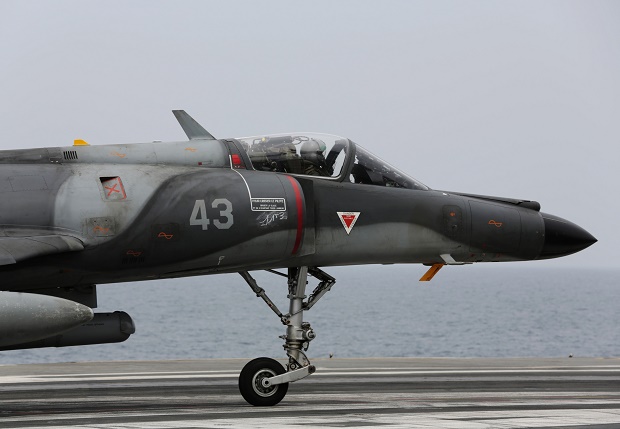France carries out first air strikes on ISIS in Syria

In this Wednesday, March 18, 2015 file photo, a French military plane lands on the French navy aircraft carrier Charles de Gaulle in the Persian Gulf. France has fired its first airstrikes in Syria as it expands military operations against ISIS extremists, President Francois Hollande’s office announced Sunday, Sept. 27, 2015. The office said that “France has hit Syria” based on information from French reconnaissance flights sent earlier this month. AP
UNITED NATIONS, United States — France carried out its first air strikes against the Islamic State of Iraq and Syria (ISIS) group in Syria on Sunday, launching a military operation as Russia and Western powers sought the upper hand in shaping the future of the war-torn country.
President Francois Hollande said six French warplanes hit an ISIS training camp near the eastern city of Deir Ezzor, and that more air strikes could follow in the coming weeks.
The action came on the eve of the UN General Assembly in New York where Syria is in the spotlight after four years of a brutal war that has killed more than 240,000 people and sent hundreds of thousands of refugees fleeing to Europe.
After sending troops and fighter planes to Syria, Russian President Vladimir Putin is set to push for stepped-up military action against ISIS jihadists in a joint effort with regional players.
“We have proposed to cooperate with the countries in the region. We are trying to establish some kind of coordinated framework,” Putin said in an interview with CBS television.
“We would welcome a common platform for collective action against the terrorists,” he said.
Iraq said it had agreed with Russia, Iran and Syria to set up a unit in Baghdad to share intelligence on ISIS.
Iranian President Hassan Rouhani said he was ready to discuss the “next plan of action” for Syria after ISIS is defeated and stressed that the Syrian government should be part of that conversation.
“But we must all act in unison and have a formula that is required to drive out the terrorists, immediately,” he told NPR radio.
Iran and Russia are allied with Syrian President Bashar al-Assad in the war, with Tehran providing financial and military support to the Damascus regime as well as military advisers on the ground.
French self-defense
The new sense of urgency to end the war comes after a year of air strikes by a US-led coalition which have failed to push back ISIS, and with Washington’s efforts to resolve the crisis in disarray.
France has been part of the US-led coalition bombarding ISIS targets in Iraq since September 2014, and has carried out 215 out of nearly 4,500 strikes there, according to French and US figures.
But until now it limited its air strikes on the extremist group to Iraqi territory.
Hollande has been under political pressure to take action against ISIS after a series of jihadist attacks in France, and fears over hundreds of citizens who have gone to wage jihad who could return home battle-hardened and vengeful.
“France hit a training camp of the terrorist group Daesh that threatened our country’s security,” Hollande told a news conference at UN headquarters, using the Arabic acronym for ISIS.
After two weeks of surveillance flights, six French warplanes targeted the training camp in an operation carried out in coordination with regional partners.
The United States and its coalition partners including Saudi Arabia, Jordan, Bahrain and the UAE have carried out more than 2,500 air strikes in Syria, according to US figures.
Assad’s role
While Russia’s deployment of troops and warplanes to Syria signalled a shift on the ground, winds are also changing on the diplomatic front as leaders scramble to find a political solution.
Western powers who previously refused to negotiate a solution unless Assad was out of the picture have softened their stance and signalled that the leader could stay on in an interim role as part of a two-stage transition.
Turkish President Recep Tayyip Erdogan, a fierce critic of Assad, suggested for the first time Thursday that Assad could have a role to play in a political transition.
British Prime Minister David Cameron is expected to press the case at the UN that a peaceful solution would ultimately require a new leadership in Damascus but Assad may not necessarily have to go immediately.
The United States and European countries including France have repeatedly branded Assad as “part of the problem – not the solution” to the crisis, blaming him for the vast majority of deaths in the war.
Washington’s strategy to arm opposition rebel groups appeared in tatters after the Pentagon admitted the latest US-trained fighters to cross into Syria had given a quarter of their equipment to Al-Qaeda.














